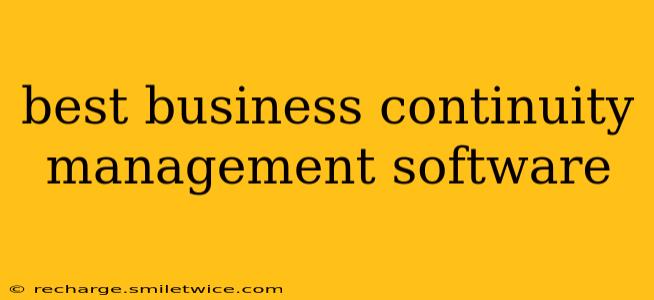The modern business landscape is fraught with potential disruptions – from natural disasters and cyberattacks to pandemics and economic downturns. Robust Business Continuity Management (BCM) is no longer a luxury; it's a necessity. But choosing the right software to support your BCM strategy can feel overwhelming. This comprehensive guide will help you navigate the options and identify the best business continuity management software for your specific needs.
We'll explore key features, different software types, and factors to consider when making your selection. By the end, you'll be equipped to choose a solution that safeguards your business's future.
What to Look for in Business Continuity Management Software
Before diving into specific software recommendations, let's define the essential features a top-tier BCM solution should offer:
- Risk Assessment & Analysis: The software should facilitate comprehensive risk assessments, allowing you to identify potential threats and their impact on your operations. This often involves vulnerability analysis and business impact analysis (BIA) capabilities.
- Business Impact Analysis (BIA) Tools: A strong BIA tool helps you quantify the potential financial and operational consequences of disruptions, prioritizing critical business functions.
- Plan Development & Management: The software needs to streamline the creation, storage, and version control of your business continuity plans (BCPs). This includes features for collaboration and plan updates.
- Communication & Alerting: Effective communication is crucial during a crisis. The software should provide tools for notifying key personnel and stakeholders in case of an incident.
- Document Management: Centralized storage and management of all relevant documents, including BCPs, contact lists, and recovery procedures, is essential.
- Incident Management: Features to track and manage incidents, facilitating efficient response and recovery efforts.
- Reporting & Analytics: Comprehensive reporting capabilities provide insights into your BCM program's effectiveness and areas for improvement. This includes metrics on plan adherence and recovery time objectives (RTOs).
- Scalability & Integration: The software should be adaptable to your business's evolving needs and integrate seamlessly with existing systems.
Types of Business Continuity Management Software
BCM software comes in various forms, each with its strengths and weaknesses:
- Cloud-Based Solutions: Offer accessibility, scalability, and automatic updates. They're often more cost-effective than on-premise solutions.
- On-Premise Solutions: Provide greater control over data security and customization but require more significant IT infrastructure and maintenance.
- Integrated Platforms: Combine BCM functionalities with other enterprise risk management (ERM) or IT service management (ITSM) tools.
Choosing the Right Software: Key Considerations
Several factors should influence your choice of BCM software:
- Business Size and Complexity: Small businesses may find simpler, cloud-based solutions sufficient, while larger enterprises may require more sophisticated, integrated platforms.
- Budget: Pricing models vary significantly, so carefully evaluate your budget and the cost-benefit ratio of different options.
- Industry Regulations: Compliance requirements within specific industries (e.g., healthcare, finance) may dictate specific functionalities or certifications.
- Integration with Existing Systems: Ensure seamless integration with your existing IT infrastructure and other relevant software.
- User-Friendliness: Choose a solution that's intuitive and easy for your team to use.
Frequently Asked Questions (FAQ)
What is the best business continuity management software for small businesses?
The "best" software depends on your specific needs, but many cloud-based solutions offer affordable and user-friendly options tailored to smaller businesses. Look for solutions with straightforward interfaces and essential BCM features like plan development, communication tools, and basic risk assessment capabilities.
How much does business continuity management software cost?
Pricing varies greatly depending on the software's features, scalability, and the number of users. You can find cloud-based options with monthly subscription fees ranging from a few hundred to several thousand dollars. On-premise solutions typically involve higher upfront costs and ongoing maintenance expenses.
What are the key features of effective business continuity management software?
Essential features include risk assessment and analysis tools, business impact analysis (BIA) capabilities, plan development and management, communication and alerting features, document management, incident management, reporting and analytics, and scalability.
How can I choose the right business continuity management software for my organization?
Consider your business size, budget, industry regulations, the need for integration with existing systems, and the user-friendliness of the software. Prioritize the features most critical to your organization's needs and evaluate different vendors based on these criteria. Consider a trial period or demo before committing to a long-term contract.
This guide provides a solid foundation for selecting the best business continuity management software for your organization. Remember to prioritize your specific needs and thoroughly evaluate different options before making a decision. Investing in a robust BCM solution is an investment in your business's resilience and long-term success.
